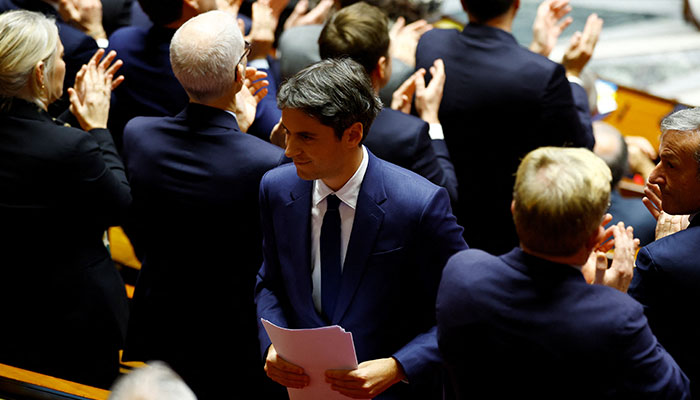
Paris: France is facing a major political crisis after Prime Minister Michel Barnier on Wednesday lost a vote of confidence in the National Assembly, raising concerns about the European Union’s second-largest economic power’s upcoming budget next year.
Far-right and left-wing lawmakers joined forces to support a motion of no confidence in Prime Minister Michel Barnier and his government, with a majority of 331 votes in favor.
Barnier is expected to present his resignation and that of his government to President Emmanuel Macron soon.
The hard left and far right punished Barnier for choosing to use special constitutional powers to approve part of an unpopular budget without a final vote in parliament, as it lacked majority support. The draft budget seeks to provide 60 billion euros ($63.07 billion) in an effort to reduce the growing deficit.
“This reality (the deficit) will not disappear with the magic of the blame motion,” Barnier told lawmakers before the vote, adding that the budget deficit would come back to haunt any government that comes next.
No French government has lost a confidence vote since Georges Pompidou’s government in 1962. Macron started the crisis by calling early elections in June that resulted in a polarized parliament.
With its president diminished, France now risks ending the year without a stable government or a 2025 budget, even though the constitution allows for special measures that would avoid a government shutdown similar to what happened in the United States.
The political turmoil in France will further weaken the European Union, which is already reeling from the collapse of the coalition government in Germany, and weeks before US President-elect Donald Trump returns to the White House.
“We have reached the moment of truth,” said Marine Le Pen, leader of the far-right National Rally, adding that Barnier’s austerity budget plans were dangerous and unfair and would have led to chaos in France.
The hard-left “France Non-Aligned” (LFI) party demanded Macron’s resignation.
LFI member Mathilde Panot said: “With the motion of no confidence, all of Emmanuel Macron’s policies have been defeated and we demand his departure.”
It is not easy to get out of the French political crisis
France is now facing a period of deep political uncertainty that is already worrying investors in French sovereign bonds and stocks. Earlier this week, France’s borrowing costs briefly exceeded those of Greece, which are generally considered much riskier.
Now Macron must make a decision.
Three sources told Reuters that Macron aims to appoint a new prime minister quickly, and one said he wants to appoint a prime minister before the reopening ceremony of Notre Dame Cathedral on Saturday, which Trump is scheduled to attend.
Any new prime minister will face the same challenges as Barnier in getting bills, including the 2025 budget, approved by a divided parliament. New parliamentary elections cannot be held before July.
Alternatively, Macron could ask Barnier and his ministers to remain in a caretaker position while he takes time to identify a prime minister capable of attracting enough cross-party support to pass the legislation.
The caretaker government could either propose emergency legislation to extend the tax and spending provisions in the 2024 budget into next year, or resort to special powers to pass the draft 2025 budget by decree – although jurists say this is a legal and political gray area. The cost will be huge.
It is also possible that Macron’s opponents will vote to oust one prime minister after another.
His opponents say the only feasible way to end the protracted political crisis is for him to resign, something he has so far shown little inclination to do.
Economic pain
The turmoil is not without risks for Le Pen, who has sought for years to convince voters that her party offers a stable government in waiting.
“The French will judge very strongly the choice you make,” Laurent Fouquier, a lawmaker from the conservative Republicans party that supports Macron, told Le Pen in parliament.
Since Macron called early summer elections, the French stock market’s benchmark CAC 40 index has fallen about 10%, the biggest loser among the European Union’s largest economies. The single euro currency fell by about 4%.
“The positive signs… seen over the summer, partly due to the Olympic Games, are now a thing of the past,” said Tariq Kamal Chaudhry, an economist at Hamburg Commercial Bank.
Barnier’s draft budget sought to reduce the fiscal deficit from 6% of the expected national product this year to 5% in 2025. He said that voting to overthrow his government would be disastrous for the state’s finances.
Le Pen ignored this warning. She said her party would support any final emergency law that extends the tax and spending provisions in the 2024 budget into next year to ensure there is temporary funding.
